- Home
- Edward Rutherfurd
London Page 2
London Read online
Page 2
On the eastern side of the two hills, there had once been a small hillfort whose low earthwork wall, now empty, could serve as a lookout post for vessels approaching from the estuary. The western hill was sometimes used by the druids when they sacrificed oxen.
And that was all there was. An abandoned settlement. A sacred spot. The tribal centres were to the north and south. The tribes over whom the great chief Cassivelaunus was master lived in the huge eastern tracts above the estuary. The tribe of Cantii, in the long peninsula south of the estuary, had already given that region the name of Kent. The river was a border between them, Londinos a sort of no-man’s-land.
The very name was obscure. Some said that a man called Londinos had lived there; others suggested that it might refer to the little earthwork on the eastern hill. But nobody knew. Somehow, in the last thousand years, the place had got the name.
The cold breeze was coming up the river from the estuary. There was a faint, sharp smell of mud and riverweed. Above, the bright morning star was beginning to fade as the clear sky turned to a paler blue.
The boy shivered. He had been standing an hour and he was cold. Like most of the folk there, he wore a simple woollen tunic that reached to the knees and was fastened at the waist with a leather belt. Beside him stood his mother holding a baby, and his sister little Branwen, whom he held by the hand. For it was his task at such times to keep her in order.
He was a bright, brave little fellow, dark-haired and blue-eyed, like most of his Celtic people. His name was Segovax and he was nine. A closer inspection, however, would have revealed two unusual features in his appearance. On the front of his head, on the forelock, grew a patch of white hair, as though someone had dabbed it with a brush of white dye. Such hereditary marks were to be found amongst several families dwelling in the hamlets along that region of the river. “You needn’t worry,” his mother had told him. “A lot of women think it’s a sign that you’re lucky.”
The second feature was much stranger. When the boy spread his fingers, it could be seen that between them, as far as the first joint, was a thin layer of skin, like the webbing on a duck’s foot. This too was an inherited trait, although it did not show itself in every generation. It was as though, in some distant, primordial time some gene in a fish-like prototype of Man had obstinately refused to change its watery character entirely, and so passed on this vestige of its origins. Indeed, with his large-eyed face and his wiry little body, the boy did somehow make one think of a tadpole or some other little creature of the waters, a quick survivor down the endless eons of time.
His grandfather had also exhibited the condition. “But they cut the extra skin away when he was a baby,” Segovax’s father had told his wife. She could not bear the thought of the knife, though, and so nothing had been done. It did not trouble the boy.
Segovax glanced around at his family: little Branwen, with her affectionate nature and her fits of temper that no one could control; the baby boy in his mother’s arms, just starting to walk and babble his first words; his mother, pale and strangely distracted of late. How he loved them. But as he stared past the druids, his face broke into a little smile. By the water’s edge was a modest raft with two men standing beside it. And one of them was his father.
They shared so much, father and son. The same little tuft of white hair, the same large eyes. His father’s face, scoured by crease lines almost resembling scales, made one think of some solemn, fish-like creature. So dedicated was he to his little family, so knowledgeable about the river, so expert with his nets, that the local people referred to him simply as the Fisher. And though other men, Segovax realized, were physically stronger than this quiet fellow with his curved back and long arms, none was kinder or more quietly determined. “He may not be much to look at,” the men in the hamlet would say, “but the Fisher never gives up.” His mother, Segovax knew, adored his father. So did he.
Which was why, the day before, he had formed the daring plan that, if he managed to carry it out, would probably cost him his life.
Now the glow along the eastern horizon was starting to tremble. In a few minutes the sun would rise and a great shimmering ray of light would come dancing from the east along the stream. The five druids facing the crowd began a low chant while the people listened.
At a signal, a figure stepped out from the crowd. He was a powerfully built man whose rich green cloak, golden ornaments and proud bearing declared him to be a nobleman of importance. In his hands he carried a flat, rectangular metal object whose burnished surface glowed softly in the gathering light. He handed it to the tall, white-bearded druid standing in the centre.
The druids turned to face the glowing horizon and the elderly figure in the centre stepped forward and on to the raft. At the same moment, the two waiting men – Segovax’s father and another – stepped on to the raft behind him and with long poles began to push the raft out into the broad stream.
The other four druids chanted, a droning sound that mysteriously grew, spreading out over the waters as the raft drew further away. A hundred yards. Two hundred.
The sun appeared, a huge red curve upon the water. It grew, its orb flooding the river with golden light. The four remaining druids, silhouetted against it, suddenly seemed to have grown into giants as their long shadows leapt into the waiting crowd.
The senior druid was out in midstream, the two men with their long poles keeping the raft steady in the current. On the northern bank, the two low hills were bathed in the sun’s reddish light. And now, like some ancient grey-bearded sea god rising up out of the waters, the tall druid on the raft raised the metal object over his head so that it caught the sunbeams and flashed.
It was a shield, made of bronze. Although most weapons on the island were made of iron, the more ancient and easily worked bronze was used for ceremonial arms requiring delicate workmanship, such as this. And a masterpiece it was, sent with one of his most trusted nobles by the great chief Cassivelaunus himself. The pattern of swirling lines and the inlaid precious stones represented the finest of the wondrous Celtic metalwork for which the island was famed. It was the most important gift the island people could make to the gods.
With a single, sweeping gesture, the druid hurled the shield high over the water. Flashing, it made an arc through the air before falling into the gleaming path laid down by the sun across the water. The little crowd let out a sigh as the river silently took its offering and moved on.
But as the old druid watched, something strange occurred. Instead of sinking out of sight, the bronze shield remained suspended just below the surface of the clear water, its metal face glinting in the light. At first the old man was astonished, until it occurred to him that the reason was very simple. The metal was beaten very thin. It was backed with a light wood. Until the wood became waterlogged, the ceremonial shield was destined to remain hovering there, covered only by a film of water.
Something else was happening too. While the dawn silently approached, the tide had turned. The current was now flowing not downriver, but upriver, from the estuary to a point several miles further upstream from Londinos. Slowly, therefore, beneath the cold, translucent wave, the shield was moving up the stream, as though being gently pulled by some invisible hand towards the island’s interior.
The old man watched and wondered what it meant. Did it portend good or evil, in face of the terrible threat?
The threat came from Rome. Its name was Julius Caesar.
Several folk had made the island of Britain their home in the thousands of years since the ice’s great retreat. Hunters, simple farmers, the makers of stone temples like Stonehenge, and, in more recent centuries, tribes who belonged to the great Celtic culture of north-west Europe. With its bardic poetry and song, its rich and echoing folklore, its astonishing and fantastic metalwork, the life of the islanders was rich. They dwelt in stout round timbered huts with warm thatched roofs. Their larger settlements were surrounded by palisades or rings of high earthwork walls. They farmed barley and
oats, kept cattle, drank ale and heady mead distilled from honey. Behind the soft northern mists, their island remained a place apart.
True, for many generations, traders from the sunlit Mediterranean world had ventured to the island, bringing luxuries from the south in exchange for furs, slaves and the island’s famous hunting dogs. In recent generations, a lively trade had developed through a harbour on the southern coast where another river descended from the ancient abandoned temple of Stonehenge. But although British chiefs liked, occasionally, to obtain wine, or silks, or Roman gold, the world from which these luxuries came was still far over the horizon and only vaguely apprehended.
But then the classical world produced one of the greatest adventurers that history has ever known.
Julius Caesar desired to rule Rome. To do so, he needed conquests. Just recently he had swept northwards all the way to the English Channel and established the huge new Roman province of Gaul. Now he had turned his eyes to this mist-shrouded island of the north.
Last year, he had come. With a modest force, mainly infantry, Caesar himself had disembarked below the white cliffs of Britain’s south-eastern shore. The British chieftains had been warned; but even so, it was an awesome thing to behold the disciplined Roman troops. The Celtic warriors were brave, though. Swooping down with horses and chariots they managed to catch the Romans off guard several times. A storm damaged Caesar’s fleet. After a series of skirmishes and manoeuvres in the coastal region, Caesar and his troops left, and the chieftains were triumphant. The gods had given them victory. When exiles warned them “That was only a reconnoitre”, most Britons did not believe it.
But then news had begun to filter across. A new fleet was being built. No fewer than five legions and some two thousand cavalry were rumoured to be under orders. Ten days ago, a messenger to the chiefs had paused at Londinos. His message was brief, and definite.
“Caesar is coming.”
The offering had been made. The crowd was dispersing. Four of the druids were returning, two to the south and two to the north of the river. As for the oldest druid who had made the offering, it was the task of Segovax’s father to row the priest up the stream to the druid’s home two miles away.
Having bade a quiet farewell to all those assembled, the old man was about to step into his boat when he turned and let his eyes rest upon the woman. It was only for a moment. Then, with a sign to the humble fisherman, he was on his way.
Only a moment, but long enough. Cartimandua trembled. They said that the old man knew everything. It might be true. She could not tell. Holding the baby on her hip, she pushed Segovax and Branwen ahead of her as she made her way across to where the horses were tethered. Was she doing right? She told herself she was. Wasn’t she protecting them all? Doing what she had to? But the sense of terrible guilt, the anguish, would not leave her. Was it really possible that the old druid her husband was rowing had guessed about the nobleman?
She waited for several minutes by the horses until the men from the great chief came. He was amongst them. Seeing her waiting, he turned aside and paused.
Young Segovax looked at the noble with interest, for this was the man who had stepped forward to hand the druid the shield. He was a stout man with a thick black beard, hard, shrewd blue eyes and an air of blunt authority. Beneath his green cloak he wore a tunic trimmed with fox fur. Around his neck the heavy torc – the Celtic circlet of gold – signified his high rank.
It was not the first time the boy had seen him. The powerful commander had twice visited the area in the last month, each time staying a night at the hamlet opposite Londinos. “You are to be ready,” he had ordered the men after inspecting their weapons. “The great chief Cassivelaunus expects our forces to gather near this point. I shall prepare the defences.” Now, Segovax’s mother, leaving her son to stand with Branwen and the baby, was moving forward to speak to him.
The noble watched her thoughtfully as she approached. As was his habit, he considered her sexual potential. She was certainly, as he had observed at their first meeting, a striking creature. Her thick, raven-dark hair fell past her shoulders. Her body was slim, on the tall side, but with heavy breasts. Breasts a man might dream about. He was aware of the small, sinuous movement her body made as she approached. He had noticed it the first time they met. Did she always move that way, or was it just for his benefit?
“Well?” he said gruffly.
“Our agreement is still good?”
He glanced across at the children, then his eyes flicked towards the dugout in which the woman’s husband was rowing the old druid. They were well out in the stream now. Her husband knew nothing. His eyes continued to take her in steadily.
“I already told you so.”
He could see her now, in future years. That pale face with its narrow cheekbones would become haggard, the seductive eyes sunken. Her passion would turn perhaps to obsession, perhaps to bitterness. A troubled spirit. But good, very good, for a few more years.
“When?” She seemed relieved, but still anxious.
He shrugged. “Who knows? Soon.”
“He must not know about it.”
“When I give orders, they have to be obeyed.”
“Yes.” She nodded but stood there uncertainly. She’s like an animal from the wild, he thought. Only half tame. He indicated that the interview was over. A few moments later he was riding away.
Cartimandua turned back to her innocent children, who knew nothing of her terrible secret. But soon they would know. And an even more terrible thought crossed her mind. Would they still love her then?
The druid’s eyes scanned the water as the dugout moved upstream. Had the shield been received by the river yet, or was it still hovering in the stream? He glanced also at the modest man rowing him. He could remember this fellow’s father, with webbed hands like the little boy’s. And his father before that. The druid sighed. Not for nothing did the people of that region call him the father of the river.
He was very old, almost seventy, yet still powerful, still an imposing figure. He stood nearly six feet tall – a giant compared with most men. His full white beard reached down to his waist, whilst his head of silver hair was bare except for a simple gold band round his forehead. His eyes were grey and watchful. It was he who performed the sacrifice of the oxen once a year on the western of the twin hills of Londinos; he who prayed in sacred groves in the oak forests of the region.
No one knew when the druid priesthood of north-west Europe had first begun, but there were more in Britain than ever, since in recent years a number had come across the sea to take sanctuary in the mist-shrouded island. It was said that the druids of Britain safeguarded the purist tradition of the ancient lore. In the interior of the island there were strange circles of stone, temples so old that no one could say even if human hands had built them, and in these, long ago, the druids were said to have met. But along the river they usually worshipped in small wooden shrines, or in sacred groves of trees.
Yet this ancient druid, it was said, had a special gift denied to other priests. For the gods, years ago, had given him second sight.
He had been in his thirty-third year when this strange gift had come to him. He himself could not say whether its possession was a gift or a curse. It was not complete. Sometimes he had shadowy premonitions, sometimes he saw future events with terrifying clarity. And sometimes, he knew, he was as blind as other men. As the years passed, he had come to accept this condition as neither good nor bad, but merely part of the order of nature.
His home was not far away. At the western, upstream end of the great two-and-a-half-mile stretch of water lay one of the river’s many majestic curves, this one making a full right angle to the south before veering eastward again. Just around this corner, a bifurcated stream had created a low rectangular island off the river’s northern bank. It was a quiet place where oak, ash and thorn trees grew. Here, in a single, modest hut, the druid had chosen, for the last thirty years, to live alone.
Often
he travelled around the hamlets along the river where he was always reverently welcomed and fed. Sometimes he would abruptly summon a villager, like Segovax’s father, to row him many miles upriver to some sacred site. But usually a little column of wood smoke would announce that he was on his island, a silent presence, so that the folk in the area considered him a guardian of the place, like some sacred stone that despite the lichen growing upon it remains unchanged by the seasons.
It was just as they were entering the curve, with the island now in view, that the old man caught sight of the shield. As before, it was still glinting softly just below the surface, inching its way upstream towards the river’s distant heart. He gazed at it. The river had not exactly rejected the offering. But it had not accepted it either. The old man shook his head. The sign seemed to match the premonition which had come to him a month ago.
His second sight had told the druid other things that morning. He had not realized what young Segovax was going to do, but he had perceived Cartimandua’s terrible dilemma. Now he also foresaw what fate had in store for the quiet fisherman before him. But it was a much greater and more terrible event that his premonition had been concerned with. Something he still did not fully understand. As they neared his home, he remained deep in thought. Could it really be that the gods of the ancient island of Britain were going to be destroyed? Or was something else, something he could not comprehend, to happen? It was very strange.
All that spring Segovax waited. Each day the boy expected messengers on foaming horses to appear, and each night he gazed at the stars and wondered, Are they crossing the sea now? But no one came. From time to time, rumours of preparation had reached the hamlet, yet there was no sign of invasion. It seemed as if the island had relapsed into quietness.
The little hamlet where the family lived was a delightful spot. Half a dozen circular huts with thatched roofs and earthen floors were surrounded by a wattle stockade that also included two pens for livestock and several storage huts raised on stilts. It stood not at the tip of the spit where the druids had waited, but about fifty yards back. At high tide, when the spit became an island, the hamlet was cut off, but no one minded. Indeed, when the place had first been settled a score of generations ago, this watery protection had been one of its attractions. The ground itself, however, being gravel-based like the twin hills opposite, was firm underfoot and dry. With the warmer spring weather, some of the marshy ground along the southern bank dried; horses and cattle grazed there; and together with the other children, Segovax and his little sister would play in these meadows strewn with buttercups, cowslips and primroses. But the best feature of the little promontory was the fishing.

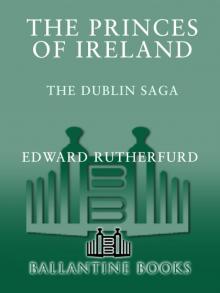 Princes of Ireland
Princes of Ireland New York
New York Sarum
Sarum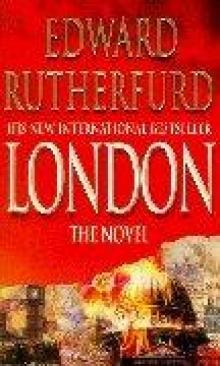 London
London Russka: The Novel of Russia
Russka: The Novel of Russia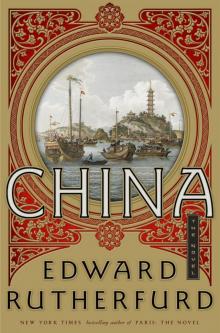 China
China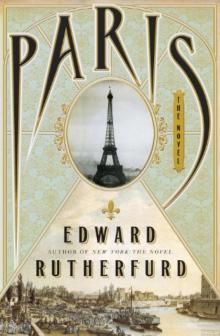 Paris
Paris The Forest
The Forest Russka
Russka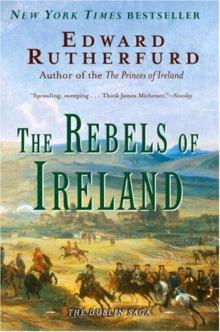 The Rebels of Ireland: The Dublin Saga
The Rebels of Ireland: The Dublin Saga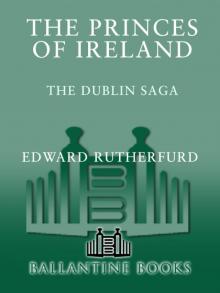 The Princes of Ireland
The Princes of Ireland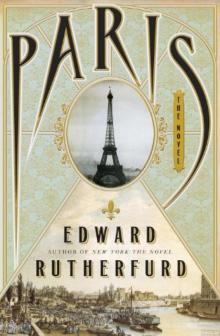 Paris: The Novel
Paris: The Novel